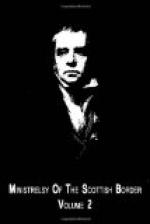And Huntly’s gone the selfsame way,
And our noble king is also
gone;
He suffered death for our nation,
Our mourning tears can ne’er
be done.
But our brave young king is now come home,
King Charles the second in
degree;
The Lord send peace into his time,
And God preserve his majestie!
[Footnote A: Glen-Prosen, in Angus-shire.]
NOTES ON THE GALLANT GRAHAMS.
Now, fare thee weel, sweet Ennerdale.—P. 38. v. 1. A corruption of Endrickdale. The principal, and most ancient possessions of the Montrose family lie along the water of Endrick, in Dumbartonshire.
Sir John the Graham did bear the gree.—P. 39. v. 1. The faithful friend and adherent of the immortal Wallace, slain at the battle of Falkirk.
Who was the traitor Cromwell, then.—P. 39. v. 5. This extraordinary character, to whom, in crimes and in success our days only have produced a parallel, was no favourite in Scotland. There occurs the following invective against him, in a MS. in the Advocates’ Library. The humour consists in the dialect of a Highlander, speaking English, and confusing Cromwell with Gramach, ugly:
Te commonwelt, tat Gramagh ting.
Gar brek hem’s word, gar do hem’s
king;
Gar pay hem’s sesse, or take hem’s
(geers)
We’l no de at, del come de leers;
We’l bide a file amang te crowes,
(i.e. in the woods)
We’l scor te sword, and wiske to
bowes;
And fen her nen-sel se te re, (the king)
Te del my care for Gromaghee.
The following tradition, concerning Cromwell, is preserved by an uncommonly direct line of traditional evidence; being narrated (as I am informed) by the grandson of an eye-witness. When Cromwell, in 1650, entered Glasgow, he attended divine service in the High Church; but the presbyterian divine, who officiated, poured forth, with more zeal than prudence, the vial of his indignation upon the person, principles, and cause, of the independent general. One of Cromwell’s officers rose, and whispered his commander; who seemed to give him a short and stern answer, and the sermon was concluded without interruption Among the crowd, who were assembled to gaze at the general, as he came out of the church, was a shoemaker, the son of one of James the sixth’s Scottish footmen. This man had been born and bred in England, but, after his father’s death, had settled in Glasgow. Cromwell eyed him among the crowd, and immediately called him by his name—the man fled; but, at Cromwell’s command, one of his retinue followed him, and brought him to the general’s lodgings. A number of the inhabitants remained at the door, waiting the end of this extraordinary scene. The shoemaker soon came out, in high spirits, and, shewing some gold, declared, he was going to drink Cromwell’s health. Many attended him to hear the particulars




